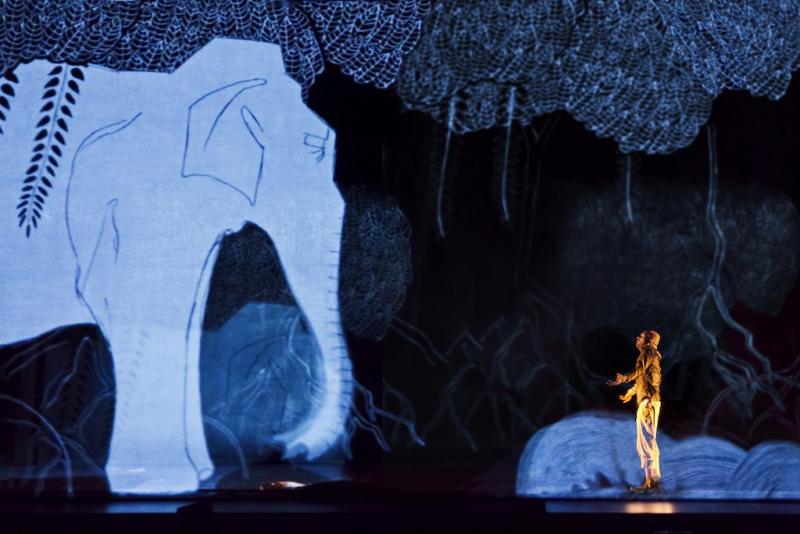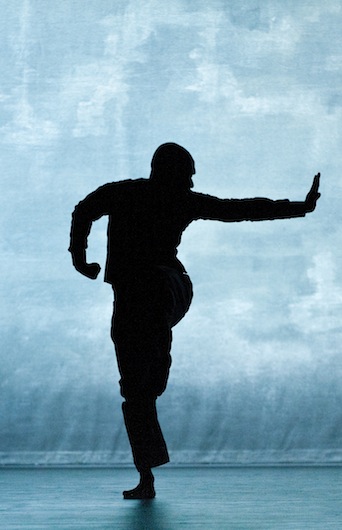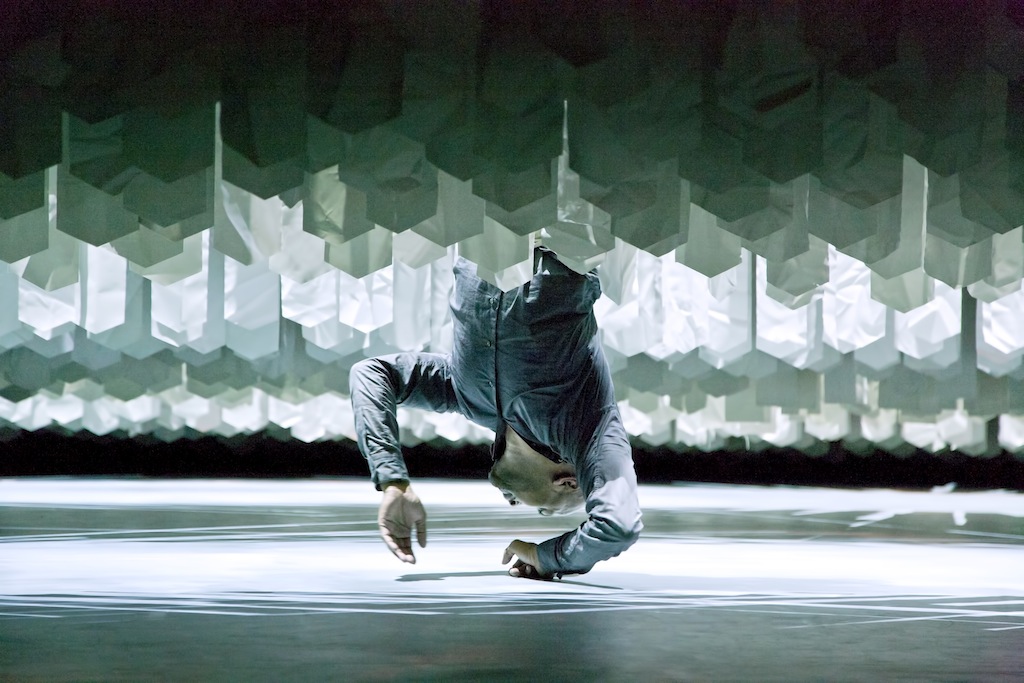Akram Khan's Desh, Sadler's Wells | reviews, news & interviews
Akram Khan's Desh, Sadler's Wells
Akram Khan's Desh, Sadler's Wells
Autobiography as poetry; after recovering from injury, the dancer returns to the stage

I’ve seen Akram Khan’s Desh twice. The first time I sat in my favourite spot – the front row – close enough to smell the sweat drenching his shirt as the demanding physicality of this ambitious solo work became evident.
The work is autobiographical or, rather, an exploration of identity – of what it means to be born of Bangladeshi parents living in England. “We’re always trying to find out who we are”, says Khan. “It doesn’t stop... I can’t get away from identity, that seems to be my curse.” And if the emotional complexity of this search for a sense of belonging does not come through, the performance simply becomes a sophisticated exercise in dance theatre rather than a deeply affecting journey of discovery.
 So this time I sat in the first circle, far enough away for the nuts and bolts to be hidden so that the magic could work; and everything came together to weave a narrative which moves between fact and fiction – from historical record to a children’s story, or a boy’s bad dream to the nightmare of partition. And whether braving the traffic of a busy street in Bangladesh or trying to make contact on his mobile, this time Khan seemed like a wanderer lost in a dizzying miasma of noise and confusion, searching for a sense of self.
So this time I sat in the first circle, far enough away for the nuts and bolts to be hidden so that the magic could work; and everything came together to weave a narrative which moves between fact and fiction – from historical record to a children’s story, or a boy’s bad dream to the nightmare of partition. And whether braving the traffic of a busy street in Bangladesh or trying to make contact on his mobile, this time Khan seemed like a wanderer lost in a dizzying miasma of noise and confusion, searching for a sense of self.
Effortlessly slipping between roles, he plays his father at different ages as well as himself as a child, a stroppy teenager and an adult. Father and son are at loggerheads, and through his body language, Khan transforms these misunderstandings into an internal conflict – a misalliance between the British and the Bangladeshi aspects of himself, as well as a failure of one generation to comprehend another.
The father tells his small son the story of a boy who ventures into the forest and climbs a tall tree to steal honey from the wild bees. Tim Yip’s delightful animations create a storybook realm of exotic woodland populated by birds and butterflies while an elephant wanders through and a crocodile basks on the riverbank. The drawings are absolutely magical yet, close-too, the interaction between dancer and graphics simply doesn’t gel; from a distance, though, it is easy to believe that the boy is lying in a cartoon boat bobbing downriver on billowing waves, or shinning up an outline tree and greedily stuffing honeycomb into his mouth.
The dancing is superb. As though driven by an indefatigable urge to keep moving, Khan rolls, churns and spins around the stage before accelerating to whirl at astounding speed with the intensity of a Dervish. He recounts the hideous story of how, during the war of secession when East Pakistan sought independence, a soldier cut the soles off the feet of a man from the future Bangladesh: “now you walk and see if you can stand on your own two feet”. Khan lies on his back kicking like an infant before shuffling on his arse across the stage, feet held painfully aloft as though discovering how to propel himself along and protect raw flesh – a powerful metaphor for rebirth, as well as a moving exploration of trauma.
 Alongside the urgency and the horror, there’s also humour. Khan lowers his head to reveal a face drawn on his bald pate and assumes the character of a cook (his father?) who feeds all 200 people in his village. Then, in an inspired piece of choreographic wizardry, he plays with his head as though it were a football – apparently dropping and catching it or rolling it along his arms.
Alongside the urgency and the horror, there’s also humour. Khan lowers his head to reveal a face drawn on his bald pate and assumes the character of a cook (his father?) who feeds all 200 people in his village. Then, in an inspired piece of choreographic wizardry, he plays with his head as though it were a football – apparently dropping and catching it or rolling it along his arms.
Last night the piece ended six minutes early. Banks of curtains evoking the tall grass recalled by his father swish in the wind before rising and falling. Taking off his western shirt, Khan crawls through them and dons the kurta worn by Bangladeshi men, a sign that finally he has embraced his origins and reached some kind of closure. At this point the curtains are meant to rise, but a technical hitch brought them to a grinding halt at floor level. Akram Khan’s apology was greeted with a standing ovation; it didn’t matter that the theatrical spell had been broken, because we had already accompanied him on an amazing journey full of visual surprises and delights.
Watch excerpts from Desh
Explore topics
Share this article
Add comment
The future of Arts Journalism
You can stop theartsdesk.com closing!
We urgently need financing to survive. Our fundraising drive has thus far raised £49,000 but we need to reach £100,000 or we will be forced to close. Please contribute here: https://gofund.me/c3f6033d
And if you can forward this information to anyone who might assist, we’d be grateful.

Subscribe to theartsdesk.com
Thank you for continuing to read our work on theartsdesk.com. For unlimited access to every article in its entirety, including our archive of more than 15,000 pieces, we're asking for £5 per month or £40 per year. We feel it's a very good deal, and hope you do too.
To take a subscription now simply click here.
And if you're looking for that extra gift for a friend or family member, why not treat them to a theartsdesk.com gift subscription?
more Dance
 'We are bowled over!' Thank you for your messages of love and support
Much-appreciated words of commendation from readers and the cultural community
'We are bowled over!' Thank you for your messages of love and support
Much-appreciated words of commendation from readers and the cultural community
 R:Evolution, English National Ballet, Sadler's Wells review - a vibrant survey of ballet in four acts
ENB set the bar high with this mixed bill, but they meet its challenges thrillingly
R:Evolution, English National Ballet, Sadler's Wells review - a vibrant survey of ballet in four acts
ENB set the bar high with this mixed bill, but they meet its challenges thrillingly
 Like Water for Chocolate, Royal Ballet review - splendid dancing and sets, but there's too much plot
Christopher Wheeldon's version looks great but is too muddling to connect with fully
Like Water for Chocolate, Royal Ballet review - splendid dancing and sets, but there's too much plot
Christopher Wheeldon's version looks great but is too muddling to connect with fully
 iD-Reloaded, Cirque Éloize, Marlowe Theatre, Canterbury review - attitude, energy and invention
A riotous blend of urban dance music, hip hop and contemporary circus
iD-Reloaded, Cirque Éloize, Marlowe Theatre, Canterbury review - attitude, energy and invention
A riotous blend of urban dance music, hip hop and contemporary circus
 How to be a Dancer in 72,000 Easy Lessons, Teaċ Daṁsa review - a riveting account of a life in dance
Michael Keegan-Dolan's unique hybrid of physical theatre and comic monologue
How to be a Dancer in 72,000 Easy Lessons, Teaċ Daṁsa review - a riveting account of a life in dance
Michael Keegan-Dolan's unique hybrid of physical theatre and comic monologue
 A Single Man, Linbury Theatre review - an anatomy of melancholy, with breaks in the clouds
Ed Watson and Jonathan Goddard are extraordinary in Jonathan Watkins' dance theatre adaptation of Isherwood's novel
A Single Man, Linbury Theatre review - an anatomy of melancholy, with breaks in the clouds
Ed Watson and Jonathan Goddard are extraordinary in Jonathan Watkins' dance theatre adaptation of Isherwood's novel
 Peaky Blinders: The Redemption of Thomas Shelby, Rambert, Sadler's Wells review - exciting dancing, if you can see it
Six TV series reduced to 100 minutes' dance time doesn't quite compute
Peaky Blinders: The Redemption of Thomas Shelby, Rambert, Sadler's Wells review - exciting dancing, if you can see it
Six TV series reduced to 100 minutes' dance time doesn't quite compute
 Giselle, National Ballet of Japan review - return of a classic, refreshed and impeccably danced
First visit by Miyako Yoshida's company leaves you wanting more
Giselle, National Ballet of Japan review - return of a classic, refreshed and impeccably danced
First visit by Miyako Yoshida's company leaves you wanting more
 Quadrophenia, Sadler's Wells review - missed opportunity to give new stage life to a Who classic
The brilliant cast need a tighter score and a stronger narrative
Quadrophenia, Sadler's Wells review - missed opportunity to give new stage life to a Who classic
The brilliant cast need a tighter score and a stronger narrative
 The Midnight Bell, Sadler's Wells review - a first reprise for one of Matthew Bourne's most compelling shows to date
The after-hours lives of the sad and lonely are drawn with compassion, originality and skill
The Midnight Bell, Sadler's Wells review - a first reprise for one of Matthew Bourne's most compelling shows to date
The after-hours lives of the sad and lonely are drawn with compassion, originality and skill
 Ballet to Broadway: Wheeldon Works, Royal Ballet review - the impressive range and reach of Christopher Wheeldon's craft
The title says it: as dancemaker, as creative magnet, the man clearly works his socks off
Ballet to Broadway: Wheeldon Works, Royal Ballet review - the impressive range and reach of Christopher Wheeldon's craft
The title says it: as dancemaker, as creative magnet, the man clearly works his socks off
 The Forsythe Programme, English National Ballet review - brains, beauty and bravura
Once again the veteran choreographer and maverick William Forsythe raises ENB's game
The Forsythe Programme, English National Ballet review - brains, beauty and bravura
Once again the veteran choreographer and maverick William Forsythe raises ENB's game

Comments
The animations in Desh were